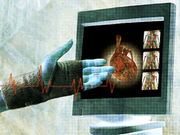Less frequent heparin dosing and greater adherence to guideline-recommended care
THURSDAY, Oct. 22, 2015 (HealthDay News) — For patients with acute myocardial infarction (MI), electronic health record (EHR) implementation is associated with some improvement in outcomes, according to a study published online Oct. 20 in Circulation: Cardiovascular Quality and Outcomes.
Jonathan R. Enriquez, M.D., from the University of Missouri in Kansas City, and colleagues examined the correlation of EHR use with quality of care and outcomes after MI. They compared outcomes for patients treated at hospitals with a fully-implemented EHR (43,527 patients), partially-implemented EHR (72,029 patients), and no EHR (9,270 patients).
The researchers found that from 2007 to 2010 there was an increase in overall EHR use from 82.1 to 99.3 percent. Compared with patients treated at hospitals with no EHR, those treated at hospitals with a fully-implemented EHR had fewer heparin overdosing errors (45.7 versus 72.8 percent; P < 0.01) and a higher likelihood of guideline-recommended care (adjusted odds ratio, 1.40). Compared with no EHR, fully-implemented EHR use correlated with reduced risk of major bleeding and mortality (adjusted odds ratios, 0.78 and 0.82, respectively) in non-ST-segment-elevation MI. Outcomes did not differ significantly by EHR status in ST-segment-elevation MI.
“EHR use was associated with some markers of patient safety, such as less frequent heparin overdosing, and slightly greater use of evidence-based therapies; however, associations with adverse outcomes after MI were mixed,” the authors write.
Two authors disclosed financial ties to the pharmaceutical industry.
Copyright © 2015 HealthDay. All rights reserved.








